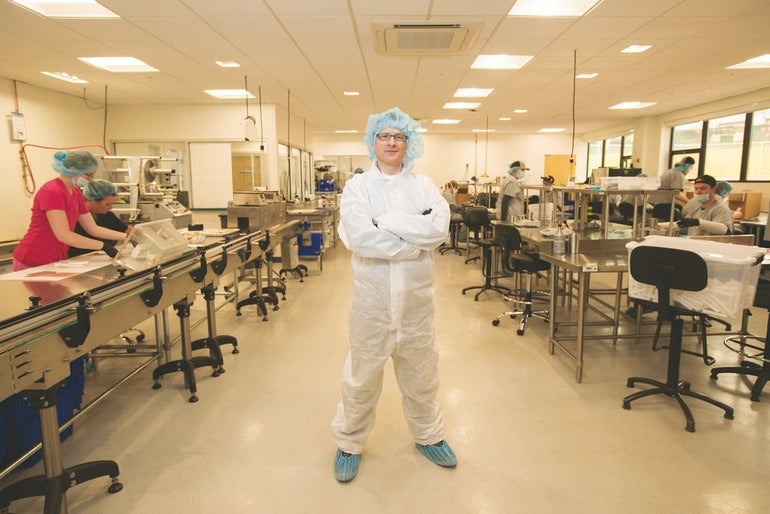It took Sira Naturals almost three years before it made one dollar off of its marijuana, which it grows in a Milford cultivation facility.
“Two-and-a-half years of spending money with no income insight,” said CEO Michael Dundas.
The heavily regulated medical and recreational cannabis industry – the latter of which is set to launch in July – provides barrier after barrier and countless hoops for young cannabis companies to jump through before they can begin making any money.
Permitting can take months or even years, and that’s assuming a particular city or town even allows those businesses to open and build a multi-million dollar facility, since Central Massachusetts communities like Westborough, Mendon and Upton have banned such businesses within their borders.
With those lessons in hand, Dundas and Sira Naturals are now launching the Sira Accelerator, an incubator program aimed at breaking down those financial and time barriers to entering the legal marijuana market.
Companies participating in the program will be allowed into Sira’s facility to develop products and expedite the time to market for products with the potential to be successful.
Those products will them go straight to Sira’s shelves at dispensaries in Needham, Cambridge and Somerville, Dundas said.
Saving on capital, finding investors
Building a facility like Sira’s takes a boatload of capital. Young companies not yet ready to do so, but have a product they want to sell, can access Sira’s kitchen and manufacturing lab and even use Sira’s cannabis oil.
The idea is to not only introduce companies to investors and industry experts, but also set entrepreneurial cannabis companies up with the skills and knowledge they need to be successful and attract the kind of financial support necessary to fund capital projects.
“Those are critical pieces of this puzzle,” Dundas said.
So far, Dundas said more than 250 companies have inquired about the program.
The rollout of the adult-use recreational market is expected to begin July 1, which is the first date the Cannabis Control Commission can award retail licenses to marijuana companies.
So far, companies have submitted 16 complete license applications to the CCC to open in Worcester County alone.
Statewide, that number is 53, but dozens more are on the way.
The rollout of the adult-use recreational market is expected to begin July 1, which is the first date the Cannabis Control Commission can award retail licenses to marijuana companies.
Of those, 945 are incomplete and 72 have been withdrawn, the CCC said in a June 14 meeting.
Access to expensive equipment & supplies
One of the dozens of companies looking to enter the adult-use market is Cape Cod’s Healing Tree Edibles, which currently manufactures naturally edible cannabis products for the medical space.
Michelle Bennett, owner of the microbusiness, is hoping to partner with Sira and utilize the company’s state-of-the-art kitchen to perfect her craft.
With many Cape Cod towns under a recreational-use moratorium, Bennett and her company are hoping to perfect the natural edible cannabis products.
To do so, Bennett is teaming up with Dundas and Sira Naturals to take part in the accelerator program.
“The program is going to be extremely beneficial to someone like myself,” said Bennett, a stay-at-home mom of 16 years. “I don’t have deep pockets, and I also don’t want to sell off portions of my company to multiple investors.”
Bennett hopes Sira’s program will provide her access to ingredients she needs – namely oil – at wholesale.
With cannabis oil and oil-infused products replacing the marijuana flower, Dundas said the company’s expertise in extracting that oil can help other budding firms in the face of the tedious and expensive process of extracting the oil.
Extraction equipment alone can cost upwards of $150,000.
Even if a company can finance and build its own cultivation facility, it takes about four months to grow a healthy-sized plant. Then, it takes another month to cure the flower and extract cannabis oil.
That entire process takes an immense amount of expertise and training, Dundas said.
“You can’t just do it off the cuff if you’ve never done it before,” he said.
Fighting the stigma
The stigma associated with marijuana is loosening, but it’s been there for a century, said Jim Borghesani, the Massachusetts former spokesman for the Marijuana Policy Project and current industry consultant.
“I consider it a hangover from 100 years of hysteria,” he said.
The lasting effects from that hangover are creating large roadblocks for marijuana entrepreneurs, most notably funding thanks to cannabis’ illegality at the federal level.
Those companies that have survived those obstacles – like Sira Naturals – have the unrivaled knowledge needed to navigate the fledgling industry.
“Knowledge like that is very helpful to get into this business,” Borghesani said.
Borghesani, who served as the spokesperson for the successful campaign to legalize and regulate recreational marijuana in 2016, said Sira’s program is the first he’s heard of, and he’s not surprised.
Dundas “is one of the smartest businessmen I know in this sector,” Borghesani said. “I’m not surprised that this first concept came from him.”

